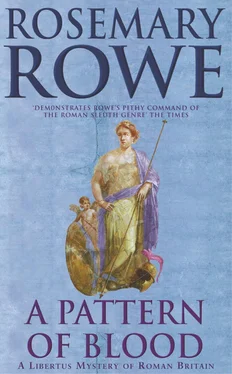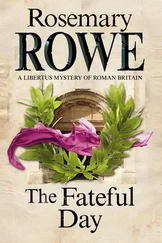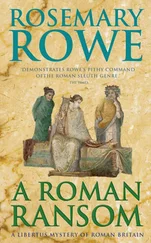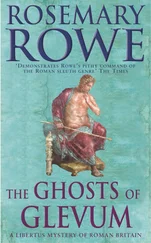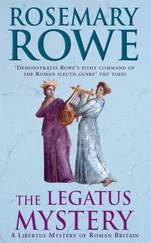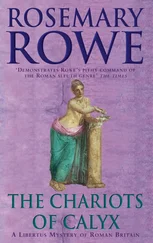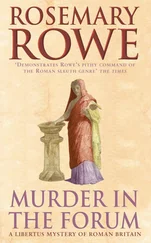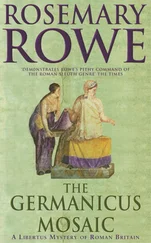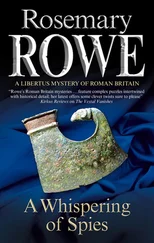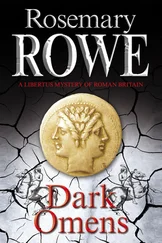Rosemary Rowe - A Pattern of Blood
Здесь есть возможность читать онлайн «Rosemary Rowe - A Pattern of Blood» весь текст электронной книги совершенно бесплатно (целиком полную версию без сокращений). В некоторых случаях можно слушать аудио, скачать через торрент в формате fb2 и присутствует краткое содержание. Год выпуска: 2000, ISBN: 2000, Издательство: Headline, Жанр: Исторический детектив, на английском языке. Описание произведения, (предисловие) а так же отзывы посетителей доступны на портале библиотеки ЛибКат.
- Название:A Pattern of Blood
- Автор:
- Издательство:Headline
- Жанр:
- Год:2000
- ISBN:9781472205063
- Рейтинг книги:4 / 5. Голосов: 1
-
Избранное:Добавить в избранное
- Отзывы:
-
Ваша оценка:
- 80
- 1
- 2
- 3
- 4
- 5
A Pattern of Blood: краткое содержание, описание и аннотация
Предлагаем к чтению аннотацию, описание, краткое содержание или предисловие (зависит от того, что написал сам автор книги «A Pattern of Blood»). Если вы не нашли необходимую информацию о книге — напишите в комментариях, мы постараемся отыскать её.
A Pattern of Blood — читать онлайн бесплатно полную книгу (весь текст) целиком
Ниже представлен текст книги, разбитый по страницам. Система сохранения места последней прочитанной страницы, позволяет с удобством читать онлайн бесплатно книгу «A Pattern of Blood», без необходимости каждый раз заново искать на чём Вы остановились. Поставьте закладку, и сможете в любой момент перейти на страницу, на которой закончили чтение.
Интервал:
Закладка:
There was at least one inn, I knew, and there were doubtless others, but Quintus Ulpius, it seemed, had insisted on entertaining the whole party in his own house. That argued a residence of a certain size, but as we rattled up to his imposing outer wall and bowled through the gates, I realised that this was a town house grander than anything I had ever seen in Glevum — or anywhere else, for that matter. The dwelling did not open directly onto the street, as most such houses do, but was set back amid a screen of trees, behind a formal garden with statues and arbours, and a colonnaded walkway skirting the outer wall. It was more like a country villa than a town residence. There was even an elaborate water basin, where an overweight Neptune straddled a disconsolate dolphin in a cascade, fed, as I discovered later, from a private water supply piped in from a nearby stream.
Behind the leafy screen of branches I could glimpse the house itself, a fine stone building in the Roman style, with an extra wing on either side. I had an impression of graceful verandas, lofty rooms, and a fountain glimpsed through the open door suggested a further courtyard beyond. At the door, a veritable army of blue-tunicked slaves stood ready to rush out and help us to descend. Being a decurion has manifest advantages.
In more ways than one, I discovered. A pair of house slaves showed us down a paved passageway to the atrium. There was no open central pool, as they reputedly have in sunnier climates, but the effect had been echoed by an amusing blue mosaic depicting sea horses and dolphins. I had just time to admire this, a beautiful inlaid table and the fine painted walls, before a woman came to meet us. She was a small, shapely woman in a Roman stola, with bright, dark eyes and a little smile that made the heart skip. This, presumably, was the heiress wife that Marcus had spoken of.
Her first words confirmed it. ‘I am Julia, Quintus’s wife,’ she said simply. She had a way of lowering her eyes which I found quite charming. ‘My husband had hoped to greet you himself, but he is still weak from his wound, and has tired himself meeting clientes. He begs that you will refresh yourself, and he will see you as soon as he is rested.’
If jealousy over his wife had been the motive for that attack, I thought, it would be understandable. This was an enchanting woman. She was no longer young — perhaps as much as twenty-five years old — but she was still undeniably attractive: not classically beautiful and statuesque in the pale Roman style, but dark, curvaceous and fine-featured. There was no doubt about her wealth: her soft amethyst-coloured stola or over-tunic, was of the finest quality, worn over a long shift of deep lilac wool. She wore a plaited girdle of purple silk, and her neck and wrists were heavy with gold. Her hair had been prinked and curled in the latest fashion, her eyebrows were plucked, and as she moved she gave off a faint aura of some exotic perfume which, even to my untutored senses, smelled extremely expensive. And yet she conducted herself with simplicity, and the brightness of those downcast eyes was due, I realised, not merely to the painted kohl line edging them, but also to tears. She seemed deeply moved by her husband’s plight.
Marcus was looking at her appreciatively. No wonder Ulpius had made enemies, I thought. Taking one thing with another, the decurion was an enviable man.
He had arranged a gracious reception. Junio visibly fretted at not being allowed to attend me personally, as our baggage was bestowed, garlands distributed and our feet and hands washed, but that could not be helped. We were visitors in this house, and he was taken off to the attic to play dice and eat bread and cheese with Marcus’s serving boy, while we were shown to couches into the elaborate dining room and a tray of fruit and watered wine was set before us. Two attractive young slave boys, so alike they might have been brothers, hastened to attend us. In this household, even a snack was offered with a flourish.
‘I am sorry,’ Marcus said, when the rituals of hospitality had been observed, ‘that Quintus is so ill. I came especially in response to his letter. I have brought the pavement-maker that I told him of, too, to discuss designs for the caldarium. Libertus is also skilled at solving mysteries. He will discover who attacked your husband, if anyone can.’
Julia turned to me, and I felt the force of that beguiling smile. ‘Then you are thrice welcome, citizen. I would offer a thousand sestertii to learn who stabbed my husband. And this caldarium means so much to Quintus. He will want the finest pavements. You knew, of course, that he was proposing to endow the new hot room in the public bathhouse to mark his year in senior office? It will win him support with the populace, he says — the poorer electors appreciate a warm place to go in the winter — and probably an honorary edict from the administrative council.’
And, I realised, make him a favoured candidate for even higher office. No wonder the man attracted clientes. This generous ‘gift to the town’ might even, in the end, prove personally profitable to the donor. A project of this size would be worth thousands of denarii, and the man dispensing money on that scale could be sure of generous ‘donations’ from dozens of wealthy hopefuls. Someone, for example, would have to supply the building stone, someone’s ships would bring the marble from Italy, someone’s potteries and forests provide the water channels and gutters. There must also, I thought wryly, be several humble but ambitious mosaic-makers even now devoting precious time and possessions to wooing Ulpius, or even promising to alter their wills in his favour, in an attempt to win this contract for the caldarium pavement. They were wasting their time, poor souls, if they but knew it. That commission was already mine. The decurion had ambitions, in his turn, and could not afford to ignore a recommendation from someone as important as Marcus.
Basking in this knowledge, I smiled at Julia. ‘You know a great deal about the project.’ I meant it as a compliment. Not many women understood the practicalities of power.
She favoured me with that smile again, glancing up under her eyelashes as though we were conspirators. ‘He does sometimes discuss these things with me, and not just with his council of friends. After all, he has the usufruct of my dowry.’
Of course, since theirs was a ‘free marriage’, her husband could legally invest the income from her lands and fortune, provided he didn’t deplete it. No wonder he discussed his projects with her. No wonder, either, that her former spouse bitterly resented that she had chosen to leave him. Previously, he would have had the rights to that dowry.
Marcus was visibly unhappy with all this vulgar talk of money, and anxious to begin the real business which had brought us here. He said, suddenly, ‘Is Quintus able to receive us now?’
She flashed him an apologetic smile. ‘I will go and see. But please, gentlemen, I beg of you, if he receives you, do not overtire him. He is still frail. Sollers says the wound is deep and might yet become infected. Last night, in fact, my husband seemed to have a slight fever. Sollers was worried; he watched all night with him, but this morning Quintus declared that he felt better and insisted on receiving his clientes again.’ She dimpled. ‘He is an obstinate man. And he wants to see you, I know. But you will remember, won’t you, that he is still weak?’
‘Of course,’ Marcus said, and she was gone, through the inner door into the courtyard. He turned to me. ‘A charming woman.’
I hid my smile. ‘Devoted, too. See how she went to check on his condition for herself, and did not merely send a slave.’
I meant it as a warning, but Marcus merely chuckled. ‘If you knew Quintus, that would not surprise you. She is right to call him obstinate. If Quintus decides upon a thing, he is hard to shake. He wants to see us. Therefore a slave would have been ordered to fetch us, whatever the state of his master’s health.’ He picked up the remaining slices of pear and popped them one by one into his mouth.
Читать дальшеИнтервал:
Закладка:
Похожие книги на «A Pattern of Blood»
Представляем Вашему вниманию похожие книги на «A Pattern of Blood» списком для выбора. Мы отобрали схожую по названию и смыслу литературу в надежде предоставить читателям больше вариантов отыскать новые, интересные, ещё непрочитанные произведения.
Обсуждение, отзывы о книге «A Pattern of Blood» и просто собственные мнения читателей. Оставьте ваши комментарии, напишите, что Вы думаете о произведении, его смысле или главных героях. Укажите что конкретно понравилось, а что нет, и почему Вы так считаете.
